
George Sewall Boutwell was an American politician, lawyer, and statesman from Massachusetts. He served as Secretary of the Treasury under U.S. President Ulysses S. Grant, the 20th Governor of Massachusetts, a Senator and Representative from Massachusetts and the first Commissioner of Internal Revenue under U.S. President Abraham Lincoln. He was a leader in the impeachment of U.S. President Andrew Johnson.

Guy Vernor Henry was a military officer and Medal of Honor recipient who served as an early Governor of Puerto Rico.

Nelson Appleton Miles was an American military general who served in the American Civil War, the American Indian Wars, and the Spanish–American War. From 1895 to 1903, he served as the last Commanding General of the United States Army before the office was abolished.

Francis Emroy Warren was an American politician of the Republican Party best known for his years in the United States Senate representing Wyoming and being the first Governor of Wyoming. A soldier in the Union Army during the American Civil War, he was the last veteran of that conflict to serve in the U.S. Senate.
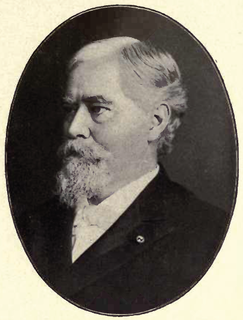
John Charles Black was a Democratic U.S. Congressman and received the Medal of Honor for his actions as a Union Army lieutenant colonel and regimental commander at the Battle of Prairie Grove during the American Civil War.

The African American Civil War Memorial Museum, in the U Street district of Washington, D.C., recognizes the contributions of the 209,145 members of the United States Colored Troops (USCT). The eponymous memorial, dedicated in July of 1998 by the African American Civil War Memorial Freedom Foundation, commemorates the service of 209,145 African-American soldiers and about 7,000 white and 2,145 Hispanic soldiers, together with the approximate 20,000 unsegregated Navy sailors, who fought for the Union in the American Civil War, mostly among the 175 regiments of United States Colored Troops.
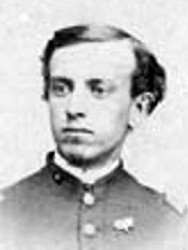
John James Toffey was a United States Union Army officer during the American Civil War who received the Medal of Honor.
William Steinmetz was a Union Army soldier during the American Civil War who received America's highest military decoration the Medal of Honor for his actions at the Battle of Vicksburg, Mississippi.
The Confederate Medal of Honor is a posthumous award created by the Sons of Confederate Veterans (SCV) in 1977 to recognize Confederate veterans who "distinguished themselves conspicuously by gallantry, bravery, and intrepidity at the risk of life, above and beyond the call of duty" during the American Civil War.
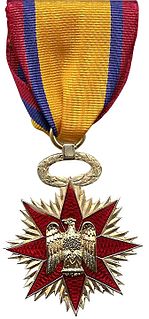
The Military Order of Foreign Wars of the United States (MOFW) is one of the oldest veterans' and hereditary associations in the nation with a membership that includes officers and their hereditary descendants from all of the Armed Services. Membership is composed of active duty, reserve and retired officers of the United States Armed Services, including the Coast Guard, National Guard, and allied officers, and their descendants, who have served during one of the wars in which the United States has or is engaged with a foreign power.
The Thanks of Congress is a series of formal resolutions passed by the United States Congress originally to extend the government's formal thanks for significant victories or impressive actions by American military commanders and their troops. Although it began during the American Revolutionary War, the practice peaked during the American Civil War. Similarly, the Confederate Congress also passed resolutions honoring extraordinary performance to individuals or military units.

Henry Shippen Huidekoper was a Union Army lieutenant colonel from Pennsylvania who received the United States military's highest decorations for bravery, the Medal of Honor, for his actions at the Battle of Gettysburg during the American Civil War.
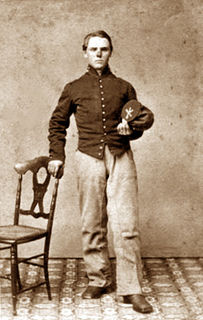
Charles W. Anderson was an American soldier who received the Medal of Honor for valor during the American Civil War.

Everett W. Anderson was an American soldier who received the Medal of Honor for valor during the American Civil War.

James W. Archer was an American soldier who received the Medal of Honor for valor during the American Civil War.
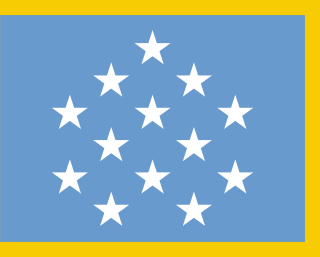
The Medal of Honor (MOH) is the United States government's highest and most-prestigious military decoration that may be awarded to recognize American soldiers, sailors, marines, airmen, Space Force guardians, and coast guardsmen who have distinguished themselves by acts of valor. The medal is normally awarded by the President of the United States, but as it is presented "in the name of the United States Congress" and is often referred to as the "Congressional Medal of Honor".
Seaman Andrew Brinn was a Scottish sailor who fought in the American Civil War. Brinn received the country's highest award for bravery during combat, the Medal of Honor, for his action aboard the USS Mississippi at Port Hudson on 14 March 1863. He was honored with the award on 10 July 1863.
John William Hart was a soldier from Maryland who fought in the American Civil War. He received the United States' highest medal for bravery during combat, the Medal of Honor, for his actions during the Battle of Gettysburg on 2 July 1863. He was issued the medal on 3 August 1897.











